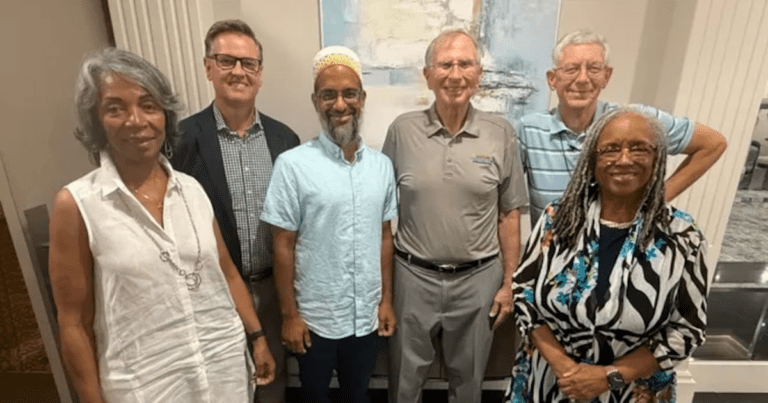October 30, 2025, 4:19pm MDT
Farmington Hills, a suburb of Detroit, Michigan, is a suburb characterized by lush trees and a four-season climate.
The city is also steeped in deep history that has shaped its community. In the early 20th century, many people flocked to the state in search of promising jobs.
“Because of the industrial age, people came here from all over the world at different times to support that industry,” said Farmington Hills Michigan Stake President Jeff Day.
His Italian in-laws immigrated in 1917 and stayed, connecting President Day personally to Detroit’s past.
The growth of cities has created communities that bring together different cultures, faiths, and backgrounds.
But every community has its challenges. Farmington Hills is not immune to deeper social divisions.
President Day described his community as generally friendly, but noted some incidents of violence and remained keenly aware of underlying tensions.
“Skepticism toward various racial groups has long been a breeding ground,” Day said.
Recognizing the “real need” for meaningful conversations at the community level, President Day’s belief in addressing hostility in communities became increasingly urgent.
So when President Day was invited to participate in Bridges to Belonging, a program designed to foster trust-building through personal relationships, he enthusiastically accepted.
In 2023, the “Bridges to Belonging” group was formed in Farmington Hills, bringing together seven key community leaders, including President Day, determined to mend the growing rift.
Two years later, on September 24, the group received the inaugural George Washington Unity Award at the Bridge Construction Innovation Showcase & Awards event at Mount Vernon in Washington, D.C., recognizing the group’s efforts to build trust and belonging in Farmington Hills.
Sharing stories sparks local movement
The group’s origins date back to Latter-day Saint Greg Geiger, president of the Detroit Interfaith Leadership Council, who attended a community interfaith group meeting in Farmington Hills. There, he learned that issues between police and minority communities remained unresolved.
In search of a solution, Geiger turned to community-building tools provided by the city council. That’s when the idea of ”bridge to belonging” came to mind.
President Day said identifying commonalities through experience helped the group build a foundation for personal connection. The program took a workshop approach and taught group members to find common values through storytelling.
From going to the movies to sharing meals, each member learned how to speak and connect with each other.
“One of the things that was very impactful for me was this idea of actually showing up for each other,” President Day said.
Along the way, President Day learned that a community where “all voices are heard” relies more on listening than on speaking. This important discovery enabled the group to support each other. President Day attended church events for members of the group, and they attended his church events.
President Day encouraged his fellow Latter-day Saints to develop skills of kindness and love, even toward those they dislike or do not understand.
“You have to love everyone,” Day said. “You don’t have a choice.”
Over time, questions began to arise about how to apply what we had learned to the broader community. Although the answer remained vague for a while, the group developed lasting friendships with each other that continued to bind them together.
In 2024, discussions arose to celebrate Juneteenth, a holiday commemorating the abolition of slavery, and all members saw it as an opportunity to unite the community.
From isolation to unity
The Rev. Patricia Coleman Burns, pastor of Farmington Hills’ First African Methodist Episcopal Church and a member of the Bridges to Belonging group, has been a leader in hosting Juneteenth celebrations for the Farmington Hills community for many years.
However, with little support from the city and a persistent misconception that Juneteenth was only for the black community, Pastor Coleman Burns felt isolated in his efforts.
That’s when the “Bridges to Belonging” group joined forces to tackle it.

“The conversation was so rich that people were able to express their hearts,” said Pastor Coleman Burns, reflecting on the 2024 celebration. “They could just say what they thought, or if they weren’t ready, they could just listen.”
There were many participants this year.
“The police were all out,” said Pastor Coleman Burns.
They brought in fire trucks and cruisers, set up sprinklers and led children through an obstacle course. Their presence, she said, provided concrete evidence of the group’s efforts to alleviate the pain felt by many in the community.
Pastor Coleman Burns acknowledged that although the group may not think alike or believe the same things, it instilled a sense of integrity because they could trust each other.
“Knowing to show up for each other and support each other is exactly what we need in these times,” she said.
President Day affirmed this opinion, noting that although the group’s members have clear doctrinal differences, they speak the same language of love.
Referring to the way the group’s members approach sharing the gospel, President Day said, “There may be some disagreements about how we do it,” he said, “but in some other areas we remain the same.”
